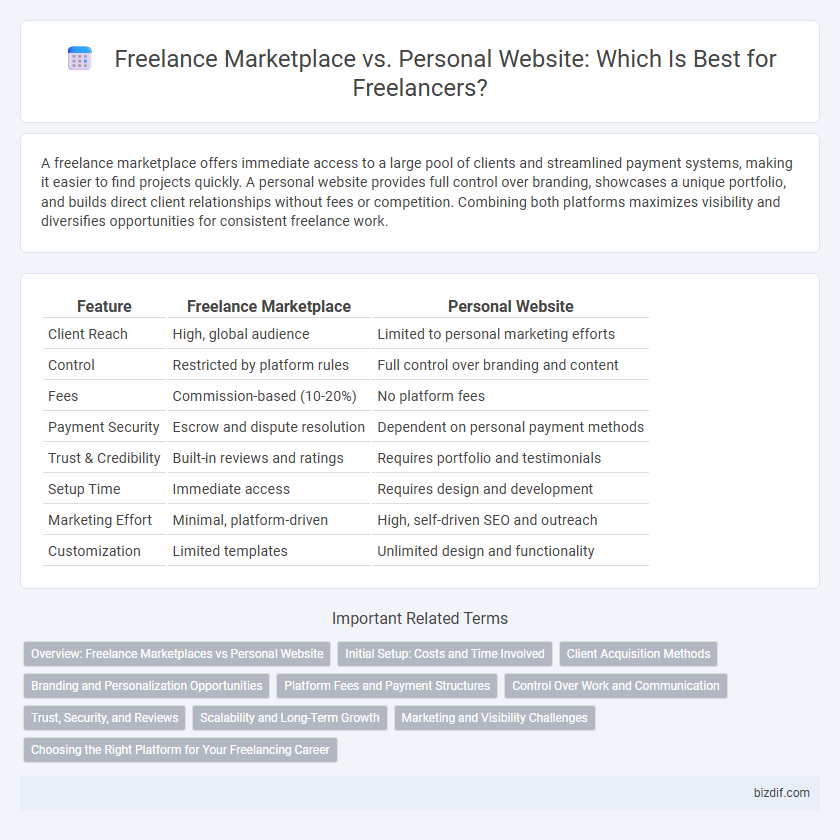A freelance marketplace offers immediate access to a large pool of clients and streamlined payment systems, making it easier to find projects quickly. A personal website provides full control over branding, showcases a unique portfolio, and builds direct client relationships without fees or competition. Combining both platforms maximizes visibility and diversifies opportunities for consistent freelance work.
Table of Comparison
| Feature | Freelance Marketplace | Personal Website |
|---|---|---|
| Client Reach | High, global audience | Limited to personal marketing efforts |
| Control | Restricted by platform rules | Full control over branding and content |
| Fees | Commission-based (10-20%) | No platform fees |
| Payment Security | Escrow and dispute resolution | Dependent on personal payment methods |
| Trust & Credibility | Built-in reviews and ratings | Requires portfolio and testimonials |
| Setup Time | Immediate access | Requires design and development |
| Marketing Effort | Minimal, platform-driven | High, self-driven SEO and outreach |
| Customization | Limited templates | Unlimited design and functionality |
Overview: Freelance Marketplaces vs Personal Website
Freelance marketplaces like Upwork and Fiverr provide extensive client access, streamlined project management tools, and integrated payment systems that simplify client acquisition and job tracking. Personal websites offer complete branding control, direct client communication, and the ability to showcase a unique portfolio without marketplace fees or competition. Choosing between these depends on priorities such as traffic volume, customization, pricing control, and long-term client relationship building.
Initial Setup: Costs and Time Involved
Freelance marketplaces require minimal initial setup with low or no upfront costs, enabling freelancers to start offering services quickly by creating profiles on established platforms like Upwork or Fiverr. Setting up a personal website involves higher initial expenses, including domain registration, hosting fees, and potential web development costs, alongside significant time investment for design and content creation. While marketplaces provide immediate access to clients, personal websites demand more upfront resources but offer greater control over branding and client relationships.
Client Acquisition Methods
Freelance marketplaces offer immediate access to a wide pool of potential clients through established platforms like Upwork and Fiverr, streamlining client acquisition with built-in search and review systems. Personal websites require investment in SEO, content marketing, and networking to attract clients but allow for greater control over branding and direct communication. Combining both approaches maximizes client acquisition by leveraging marketplace visibility and personal site credibility.
Branding and Personalization Opportunities
Freelance marketplaces offer immediate access to a broad client base but limit branding and personalization due to standardized profiles and platform constraints. Personal websites provide complete control over branding elements, enabling freelancers to showcase unique skills, testimonials, and portfolios tailored to target audiences. Custom domains, personalized content, and advanced SEO strategies on personal websites significantly enhance visibility and professional identity compared to generic marketplace profiles.
Platform Fees and Payment Structures
Freelance marketplaces typically charge platform fees ranging from 5% to 20% per transaction, impacting overall earnings, while personal websites incur minimal fees but require independent payment processing solutions like PayPal or Stripe, which charge around 2.9% plus $0.30 per transaction. Marketplaces often handle payment security, dispute resolution, and billing, providing convenience at the cost of reduced profit margins. Personal websites offer complete control over pricing and client relationships, but freelancers must manage invoicing, payment tracking, and potential delays independently.
Control Over Work and Communication
Freelance marketplaces offer streamlined client communication but limit control over branding, project terms, and direct payment methods. Personal websites enable freelancers to establish a unique professional identity, negotiate contracts independently, and maintain full control over client interactions. This autonomy enhances trust and allows tailored communication strategies that align with individual work preferences.
Trust, Security, and Reviews
Freelance marketplaces offer built-in trust frameworks with verified reviews and secure payment systems, making them a safer choice for clients and freelancers. Personal websites provide full control over branding and client interactions but require freelancers to independently establish credibility and implement security measures. High-quality portfolios and third-party testimonials on personal sites can enhance trust, yet marketplaces remain superior for initial client confidence through transparent review systems and dispute resolution.
Scalability and Long-Term Growth
Freelance marketplaces offer immediate access to a broad client base but often impose fees and intense competition, limiting scalability and long-term growth potential. In contrast, a personal website provides full control over branding, client relationships, and pricing, enabling sustainable growth and higher profit margins. Investing in a personal website enhances credibility and attracts repeat clients, fostering scalable and enduring freelance success.
Marketing and Visibility Challenges
Freelance marketplaces offer immediate access to a large pool of clients, increasing visibility through established platform algorithms and reviews, but they often face high competition and limited branding control. Personal websites provide full marketing autonomy and allow freelancers to showcase unique value propositions, yet they require consistent SEO efforts and strategic content marketing to attract organic traffic. Balancing marketplace exposure with personal website optimization enhances overall client acquisition and long-term brand building.
Choosing the Right Platform for Your Freelancing Career
Freelance marketplaces offer immediate access to a broad client base, streamlined payment systems, and built-in trust mechanisms, making them ideal for beginners seeking exposure and steady projects. Personal websites provide complete control over branding, portfolio presentation, and direct client relationships, essential for freelancers aiming to establish a unique identity and long-term business growth. Evaluating your career goals, industry niche, and marketing skills is crucial to selecting the platform that aligns with your freelancing aspirations and maximizes income potential.
Freelance marketplace vs Personal website Infographic

 bizdif.com
bizdif.com